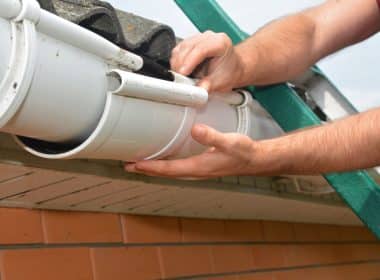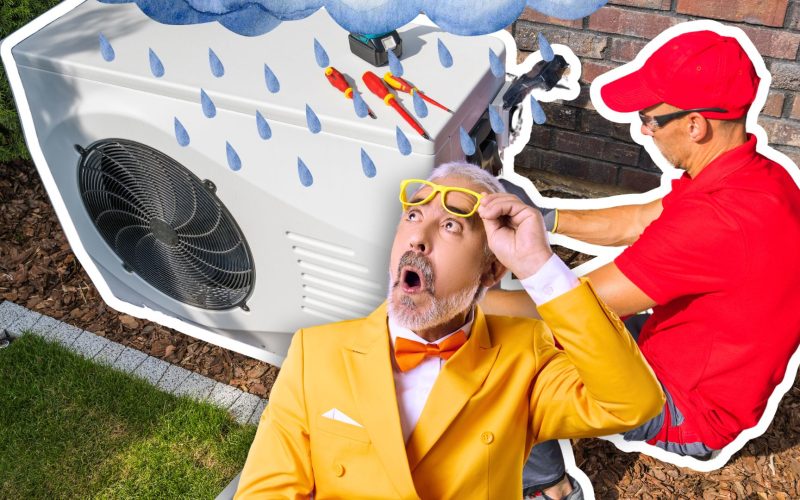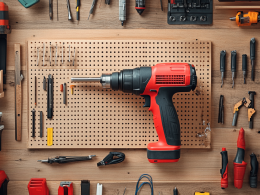When raindrops start falling, many homeowners worry about their outdoor AC units.
After all, water and electricity don’t mix, right?
I’m here to put your mind at ease.
Your air conditioner is tougher than you might think; a little rain won’t hurt it.
Rain can even benefit your AC unit in some ways.
In this post, I’ll explain how air conditioners are built to withstand typical weather conditions, including rain.
We’ll examine why rain isn’t usually a problem for your AC and can even help clean it.
I’ll also cover some situations where heavy rain or flooding could cause issues and what you can do to protect your unit in extreme weather.
By the end, you’ll understand exactly how rain affects your AC’s performance and when you might need to take precautions.
Positive Effects of Rain on the AC Unit
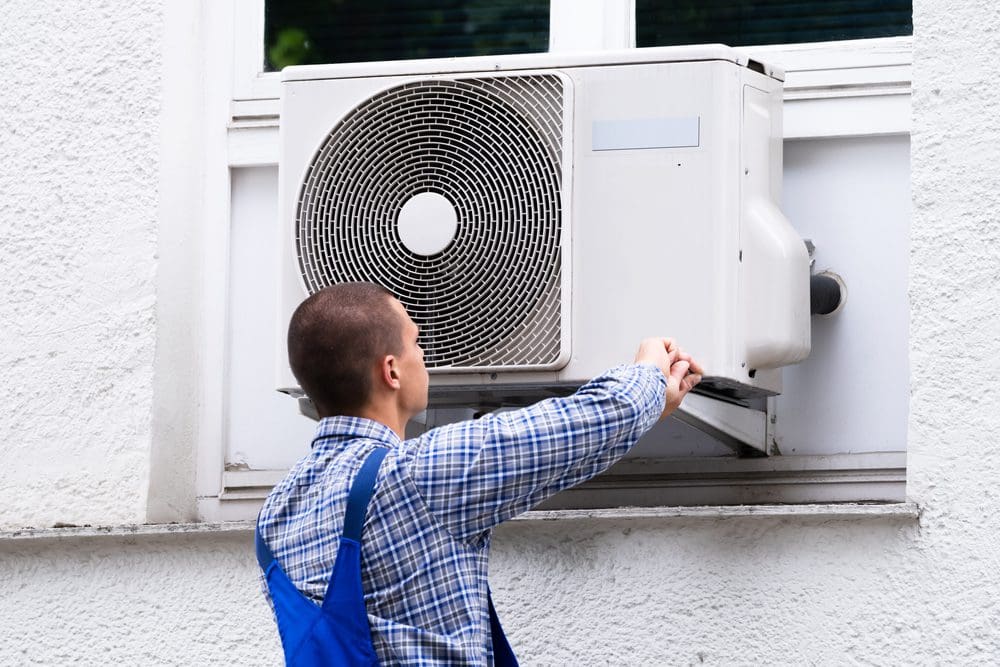
Rain can benefit your AC unit in several ways.
Let’s explore how nature’s showers can be a friend to your cooling system, providing some unexpected advantages to your air conditioning unit.
1. Natural Cleaning
Rain is a natural cleaner for your AC unit, washing away accumulated debris and improving efficiency.
This free cleaning service from Mother Nature can help maintain your AC’s performance.
- Rain helps wash away dirt, dust, and debris from the AC unit.
- The water naturally rinses off pollen, leaves, and other airborne particles accumulating on the unit.
- It can reach areas that might be difficult to clean manually, such as between the condenser coil’s fins.
Benefits
Improves overall efficiency:
- Clean coils transfer heat more effectively, reducing the workload on the system.
- Better airflow through clean components leads to more efficient operation.
Reduces the need for manual cleaning:
- It lessens the frequency of professional cleanings, potentially saving on maintenance costs.
- Decreases the time homeowners need to spend on AC upkeep.
Insights
- Rain acts as a natural cleaning agent, clearing away obstructions that can impede the unit’s performance.
- Regular rainfall can help maintain the unit’s cleanliness between scheduled maintenance sessions.
- However, rain cleaning does not replace the need for professional maintenance, as it cannot remove all types of buildup.
2. Cooling Aid
Rainwater can assist in cooling, enhancing your AC’s performance during operation.
This natural cooling effect can boost your system’s efficiency.
- Rainwater cools the condensing coil.
- As rain falls on the outdoor unit, it absorbs heat from the condenser coil.
- This process is similar to how evaporative coolers work, utilizing water’s heat-absorbing properties.
Benefits
Enhances the cooling process:
- The cooler condenser can reject heat more efficiently, improving the cooling cycle.
- This can lead to quicker cooling of your indoor space.
Helps maintain optimal operating temperature:
- It prevents the unit from overheating during peak demand periods.
- It can extend the lifespan of components by reducing thermal stress.
Insights
- The natural cooling effect of rainwater can reduce the load on the condenser, leading to better efficiency and longer lifespan.
- This cooling aid is particularly beneficial during hot, humid days when AC units work hardest.
- While beneficial, this effect is temporary and shouldn’t be relied upon as a primary cooling method.
Potential Risks of Rain on the AC Unit
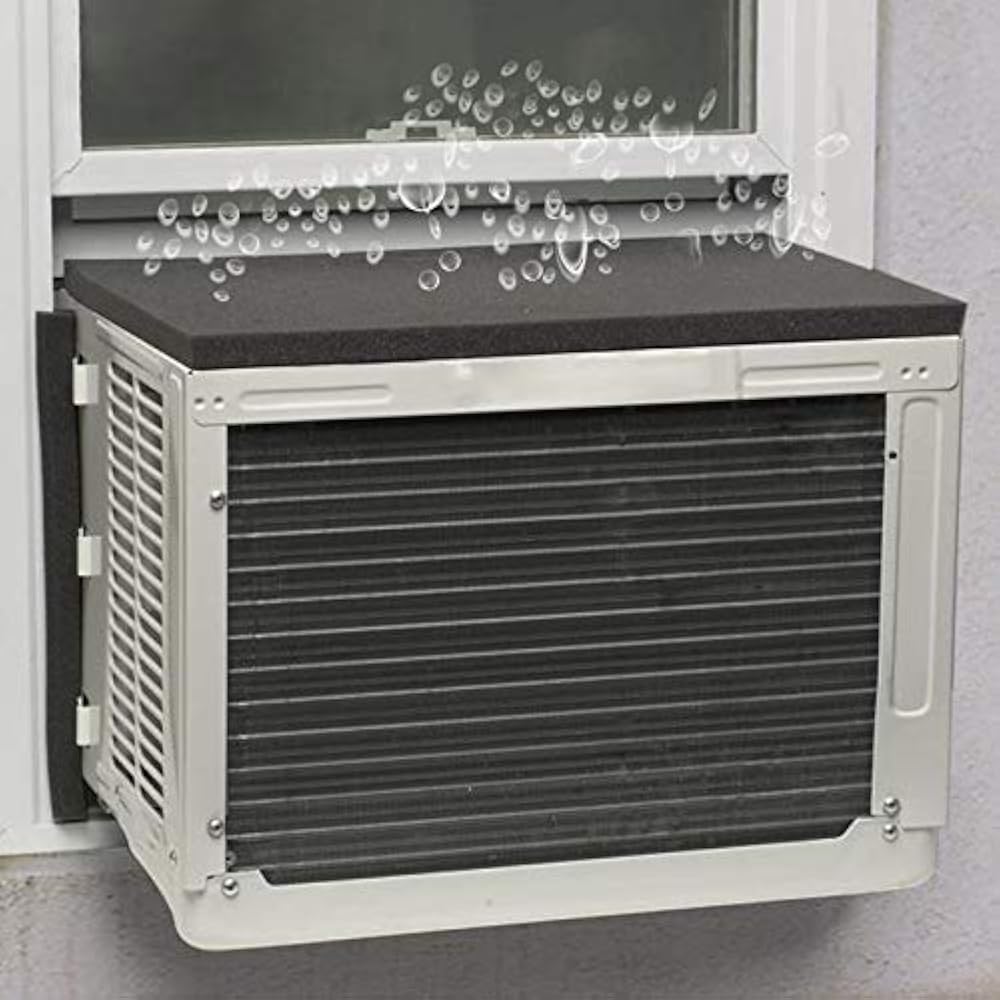
While rain can be beneficial, it also poses some risks to your AC unit.
Awareness of these potential issues can help you take preventive measures and protect your investment in home comfort.
1. Flooding
Excessive rainfall can lead to flooding, damaging your AC unit if precautions aren’t taken.
Understanding the risks associated with flooding is crucial for protecting your AC system.
Impact
Standing water around the unit can cause damage if levels exceed 15 inches.
Water can enter the electrical components of the unit, causing short circuits.
Prolonged submersion can lead to corrosion of internal parts.
Risks
Damage to electrical components:
- Control boards, capacitors, and wiring can be compromised by water intrusion.
- Electrical failures can lead to a complete system shutdown.
Potential short circuits:
- It can cause sparking or fires if the unit is powered on while wet.
- It may require the replacement of multiple components or the entire unit.
Insights
Flood water can infiltrate the unit’s electrical system, leading to serious malfunctions and safety hazards.
Units installed on raised platforms or in areas with good drainage are less susceptible to flood damage.
After flooding, a professional inspection is crucial before restarting the system.
2. Storm Damage
Severe storms can bring more than just rain, potentially causing physical damage to your AC unit.
High winds, flying debris, and lightning strikes pose significant risks during extreme weather events.
Impact
- It Can physically damage the unit.
- Strong winds can bend the fins on the condenser coil, restricting airflow.
- Large debris, like branches or roof tiles, can dent or puncture the unit’s casing.
Risks
- Dented casings can lead to improper sealing and water intrusion.
- Damaged fans may cause imbalance, leading to increased wear and noise.
- Bent or broken condenser coils can lead to refrigerant leaks.
- Impact damage can misalign internal components, affecting performance.
Insights
- The physical impact of debris can compromise the structure and functionality of the AC unit, requiring thorough inspections after a storm.
- Regular tree trimming and securing loose objects around the AC can minimize storm-related risks.
- Consider installing protective covers or cages designed for extreme weather conditions.
3. Corrosion
Prolonged exposure to moisture can lead to corrosion, affecting your AC’s components and performance.
Understanding how corrosion occurs and its effects is key to preventing long-term damage to your system.
Impact
- Continuous exposure without ventilation leads to rust and corrosion.
- Metal components like screws, bolts, and the unit’s frame are particularly vulnerable.
- Corrosion can spread to internal parts if left unchecked.
Risks
- Deterioration of metal parts:
- Weakened structural integrity can lead to component failures.
- Corroded electrical connections can cause intermittent operation or system failure.
Growth of mold and mildew:
- It can occur in damp, poorly ventilated areas of the unit.
- This may lead to unpleasant odors and reduced air quality.
Insights
- Proper ventilation and regular maintenance are key to preventing corrosion and extending the unit’s lifespan.
- Using corrosion-resistant coatings or materials in high-humidity areas can provide additional protection.
- Regular inspections can catch early signs of corrosion before they become major issues.
Do Window AC Units Require Special Care in Rain?
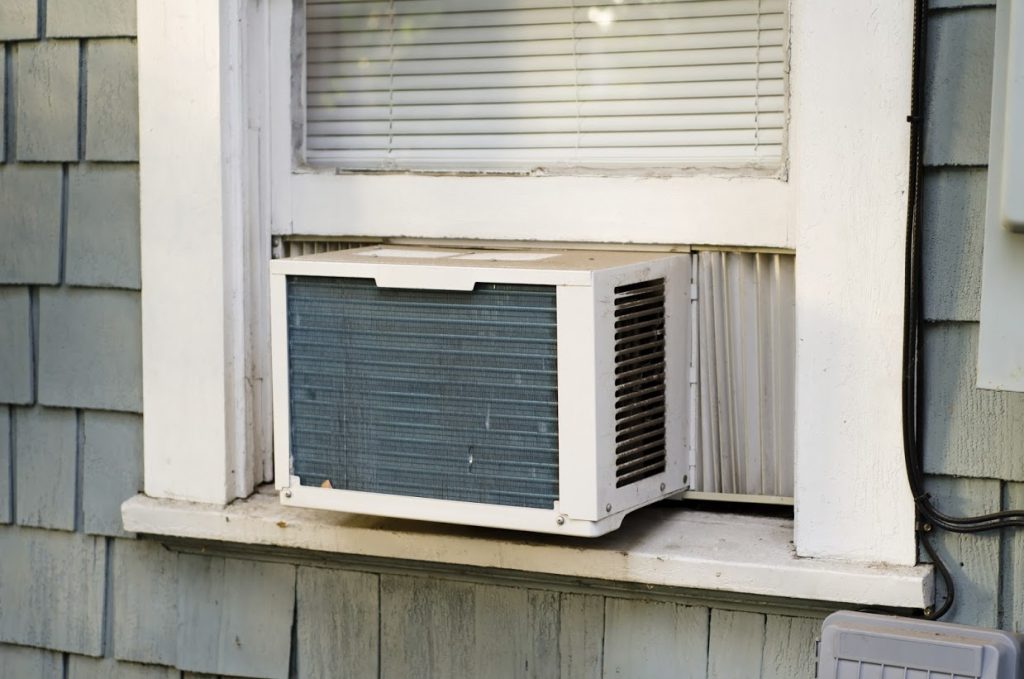
Window AC units require special consideration when it comes to rain protection.
Proper installation and maintenance are crucial for these units, as they are more exposed to the elements than central AC systems.
1. Installation Considerations
Installing window AC units is essential to prevent water damage and ensure efficient operation.
Proper sealing and insulation are vital in protecting the unit and your home.
Importance
- Prevents water seepage and damage to the home’s interior.
- It keeps rainwater from entering the home around the edges of the unit.
- It helps maintain the energy efficiency of the room.
Benefits
- Protects the integrity of the home:
- Prevents water damage to windowsills, walls, and flooring.
- Reduces the risk of mold growth in hidden areas around the unit.
Ensures efficient operation of the AC unit:
- It prevents warm, humid air from entering the unit’s edges.
- Maintains the desired indoor temperature more consistently.
Insights
- A well-sealed window AC unit protects against water damage and enhances overall efficiency by maintaining a controlled environment.
- Use weatherstripping and foam insulation to create a tight seal around the unit.
- Regularly check and replace seals, as they can degrade over time.
2. Adequate Insulation
Importance
- Minimizes humidity-related issues.
- It prevents condensation from forming on the unit and surrounding areas.
- It helps maintain consistent temperature control in the room.
Benefits
- Reduces the risk of mold and mildew:
- Less condensation means fewer damp areas where mold can grow.
- It helps maintain better indoor air quality.
Maintains consistent indoor air quality:
- It prevents outdoor humidity from seeping around the unit.
- Reduces the workload on the AC, potentially extending its lifespan.
Insights
- Proper insulation around the window AC unit can significantly reduce the impact of external humidity on indoor conditions.
- Consider using insulation panels or reflective foil to enhance the unit’s efficiency.
- Pay special attention to insulating gaps between the upper and lower window sashes.
3. Maintenance Tips
Regular maintenance is key to optimizing your window AC unit, especially during rainy seasons.
A well-maintained unit is more resilient to the challenges posed by wet weather.
Importance
- Ensures the unit remains effective during rainy conditions.
- It helps identify potential issues before they become major problems.
- Keeps the unit operating at peak efficiency.
Benefits
Early detection of potential issues:
- Spot signs of water damage or corrosion before they worsen.
- Address small problems before they lead to system failure.
Consistent performance and longevity:
- Well-maintained units perform better and use less energy.
- Regular care can significantly extend the life of the AC unit.
Insights
- Routine inspections and maintenance activities are crucial for identifying and addressing problems before they escalate, ensuring the unit operates smoothly through all weather conditions.
- Clean or replace filters monthly, especially during high-use periods.
- Regularly check and clean the condensate drain to prevent water buildup and potential overflow.
- Inspect the exterior casing and seals before and after rainy seasons for any signs of wear or damage.
Measures to Protect Window AC
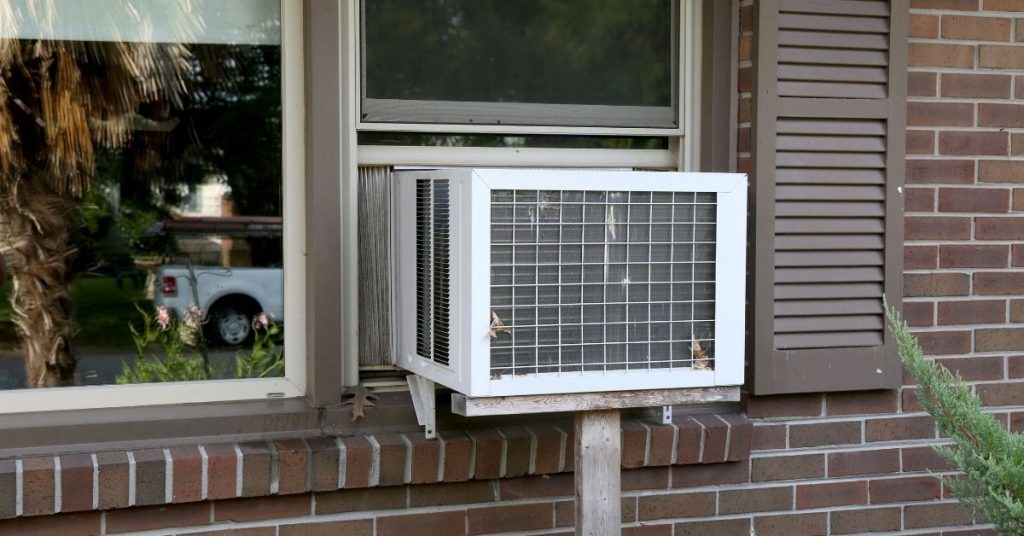
Taking proactive steps to protect your AC unit from rain and adverse weather conditions is crucial for maintaining its performance and extending its lifespan.
This section will explore various protective measures you can implement to safeguard your cooling system.
1. Regular Maintenance
Regular maintenance is the cornerstone of AC protection.
It helps identify potential issues early and keeps your unit running at peak efficiency.
Scheduling Inspections and Cleanings
- Routine Checks: Regular inspections are crucial for early detection of potential problems. Aim to inspect your AC unit at least twice a year, ideally before the summer and winter.
- Cleaning: Clean your AC unit regularly to keep it free from debris and dirt. This includes removing leaves, twigs, and other obstructions around the unit and gently cleaning the fins with a soft brush or cloth.
Professional Assessments
- Expert Evaluation: Professional HVAC technicians can spot issues that might not be apparent to the untrained eye. They can identify early signs of water damage, electrical problems, or mechanical wear.
- Maintenance Services: Regular professional maintenance services can include tasks like lubricating moving parts, checking refrigerant levels, and ensuring proper electrical connections, all of which contribute to the longevity of your AC unit.
2. Flood Prevention
Protecting your AC unit from flood damage is crucial, especially in areas prone to heavy rainfall or near water sources.
Proper Drainage
- Drainage Systems: Ensure that the area around your outdoor unit has proper drainage. This might involve grading the land to slope away from the unit or installing a French drain system.
- Regular Checks: Periodically inspect your drainage system, especially before rainy seasons. Clear any blockages and ensure water flows freely away from your AC unit.
Installing Raised Platforms
- Elevation Benefits: Elevating your AC unit on a raised platform can protect it from ground-level flooding. This is particularly important in low-lying areas or regions prone to flash floods.
- Installation Tips: When installing a raised platform, ensure it’s sturdy and level. Use weather-resistant materials like concrete or treated wood, and ensure the platform is securely anchored to prevent shifting.
3. Storm Preparedness
Severe storms can pose significant risks to your AC unit.
Taking precautions before a storm can prevent damage and extend your unit’s lifespan.
Using Sturdy Covers
- Cover Materials: During severe storms, consider using sturdy materials like plywood to protect your AC unit from flying debris. Avoid plastic covers as they can trap moisture.
- Proper Usage: Securely fasten the cover to prevent it from becoming airborne. Remember to remove the cover promptly after the storm to allow proper ventilation.
Installing Surge Protectors
- Surge Protection: Lightning strikes can cause power surges that damage your AC’s electrical components. Installing a surge protector can safeguard your unit from these sudden voltage spikes.
- Installation and Maintenance: Have a professional electrician install a whole-house surge or dedicated protector for your AC unit.
Regularly check the surge protector to ensure it’s functioning correctly.
4. Corrosion Prevention
Preventing corrosion is key to maintaining your AC unit’s structural integrity and efficiency, especially in areas with high humidity or salt air.
Avoiding Plastic Covers
- Breathable Materials: If you cover your AC unit during off-seasons, use breathable materials that allow air circulation. This prevents moisture from becoming trapped and causing corrosion.
- Risks of Plastic Covers: Plastic covers can trap moisture against the unit, creating an ideal environment for rust and mold growth. Avoid using them, especially for extended periods.
Regular Inspections for Rust
- Inspection Frequency: Inspect your AC unit for signs of rust at least twice a year or more frequently in coastal or humid areas. Look for any discoloration or flaking on metal surfaces.
- Mitigation Steps: If you spot rust, clean the affected area and apply a rust-inhibiting primer and paint. For extensive rust, consult a professional to assess whether component replacement is necessary.
Conclusion
Rain doesn’t have to be a threat to your AC unit.
While it can provide some benefits, such as natural cleaning and cooling assistance, it’s important to be aware of potential risks, such as flooding, storm damage, and corrosion.
By understanding how rain affects your air conditioner, you can take appropriate measures to protect your investment.
Regular maintenance, proper installation, and preventive measures are key to ensuring your AC unit’s longevity and efficiency, regardless of weather conditions.
From central units to window ACs, each type requires specific care and attention.
Remember, a well-maintained AC unit not only performs better but also saves you money on energy bills and costly repairs in the long run.
By implementing the protective measures we’ve discussed, you can keep your AC running smoothly through rain or shine.
Don’t wait for the next rainstorm to take action.
Schedule a professional AC inspection today to ensure your unit is ready for whatever weather comes its way.




